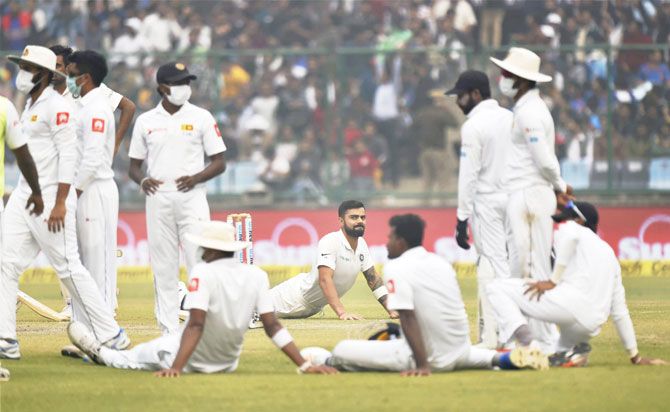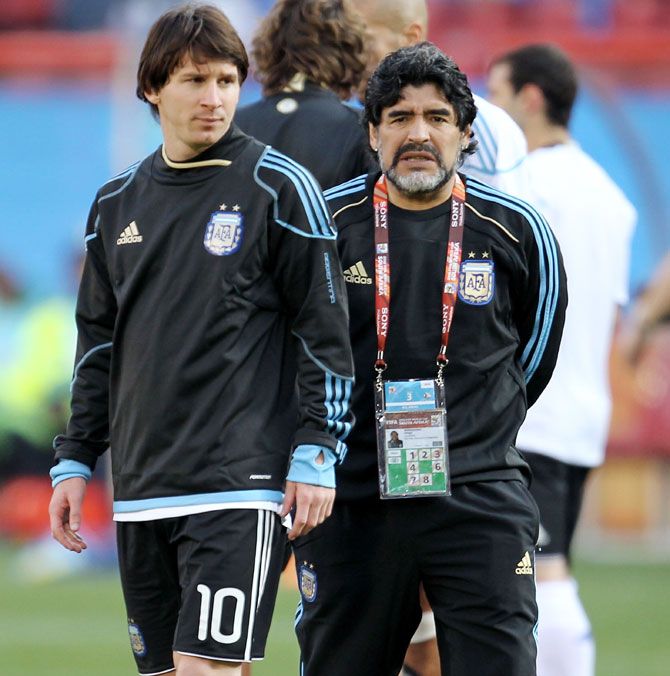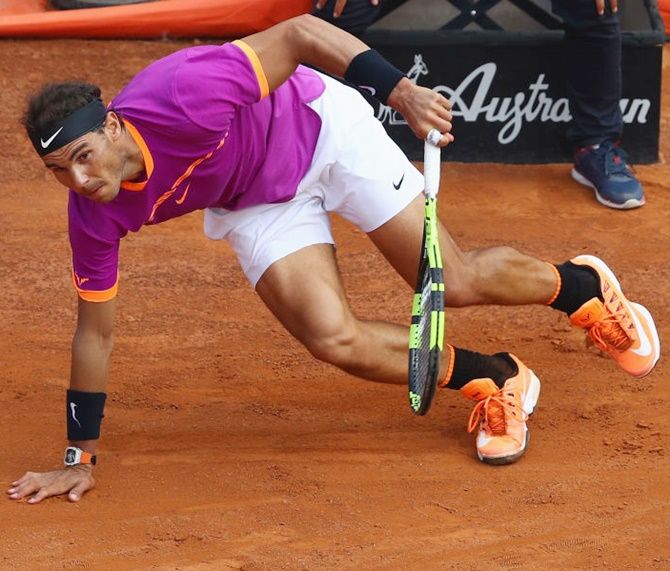'What is difficult for one athlete is easy for another. Plus some adjust better than others.'
Virat Kohli batted continuously for over a day in Delhi and showed no signs of fatigue caused by the pollution, marvels Dhruv Munjal.

In early 2008, Diego Maradona -- surprisingly slim and yet to be named coach of the Argentine national team -- and a bunch of his former team-mates enjoyed a kickabout against a Bolivian team of politicians and ex-players led by the country's president Evo Morales in La Paz.
The match was officially designed to raise money for flood victims in Bolivia, but Maradona was out to prove something else: That playing football at high altitudes wasn't beyond the endurance scope of a professional footballer.
If Maradona -- he was 47 at the time -- could last 90 minutes there, a modern-day footballer, raised by expert conditioning coaches and guided by accurate, sophisticated fitness-tracking technologies, could surely do the same.
Apart from an eagerness to meet up with old friends, Maradona's decision to play the game was chiefly driven by the will to register a protest.
Four months earlier, FIFA had ruled that international matches could only be played above 2,750 metres if visiting teams were given one week to acclimatise and above 3,000 metres if they were given two weeks. Maradona had termed the decision 'disgraceful'.
La Paz's Estadio Hernando Siles is located 3,600 metres above sea level.
With the ruling effectively denying Bolivia, Colombia and Ecuador the right to host matches in their capital cities -- La Paz, Bogotá and Quito, respectively -- FIFA, in the face on intense scrutiny, rescinded the ban in May that year.

A year on, Maradona was left secretly ruing his criticism; he should've perhaps lauded FIFA's scheduling sagacity, instead of publicly decrying it.
In the stamina-sapping air of La Paz, Maradona's Argentina was walloped 6-1 by the hosts in a breathless game of football -- literally.
Angel Di Maria was left needing the assistance of an oxygen cylinder, and Lionel Messi spent most of the game down on his haunches, apparently acutely sick.
Despite the climatic impediments, this was a stunning result; eventually made more spectacular by the fact that Bolivia finished second from bottom in the South American World Cup qualifying group.
There was nothing common between Messi, a global footballing colossus, and Suranga Lakmal, a slippery pace bowler fairly unknown outside the subcontinent. That is, of course, until Lakmal ended up vomiting uncontrollably against India in the New Delhi Test.
Lakmal's plight -- much like Messi's -- was triggered by an inability to breathe. Lakmal's team-mates all wore masks while fielding.
If it was the thin mountain air in La Paz, it was the crippling smog in Delhi.
Either way, according to some, these were 'inhumane' conditions for the hosting of any sport.
The worry of Lankan players sporting 'ridiculous' pollution masks acting as a dreadful advertisement for cricket in India aside, the Delhi Test raised a more pertinent question: When do conditions for an athlete become truly insufferable?
Moreover, how does this affect their performance?
It is important to understand here that the events in La Paz, for instance, were the outcome of natural weather phenomena.
In Delhi, the problem was more man-made. The former is like Tamil Nadu playing Himachal Pradesh in a Ranji Trophy game at Dharamsala in December and performing terribly; the latter is more like asking Roger Federer to play a tournament in Southern California with a wildfire raging in the backdrop.
"It is vital to decipher what we are constituting as cruel conditions. What is difficult for one athlete is easy for another. Plus some adjust better than others. So it's difficult to decide," says Arun Tandon, a Delhi-based sports psychologist.
Adaptability remains one of the crucial prerequisites for any kind of tangible success in sport.
This feature is perhaps more prone to amplification in cricket, since the international calendar is woven around a home-away format and the pitches and climates are vastly dissimilar.
This is unlike club football in Europe, for example, where the weather across the continent is more uniform and the perplexities of the playing surface aren't a deciding factor.
"You can understand why Virat Kohli wants more preparation time for the tour to South Africa. In cricket, the weather influences the pitch. So you have to adapt to both, and you need some time for that," says Nayan Mongia, former Indian wicket-keeper.
Intriguingly, Kohli batted continuously for one-and-a-half days in Delhi and showed no signs of fatigue caused by the pollution.
"Kohli is just fitter than the others. The smog was bad, but the Sri Lankans weren't at their best physically," says another former Indian cricketer, on the condition of anonymity.
Dinesh Chandimal, the Lankan skipper, was seen in a mask in the field throughout the game, but stroked an elegant hundred in the first innings without wearing one. "He showed that it was possible to play in this weather. That raises questions over the preparedness of some of his teammates," adds the cricketer.
When it comes to dealing with the harshness of the weather, individual athletes have it easy compared to some of their counterparts specialising in team sports.
In 2008, Haile Gebrselassie skipped the Olympic marathon, blaming his withdrawal on the worrying pollution levels in Beijing. "Individuals have that luxury. You can't say no when you're a part of a team," says Tandon.
Curiously, some of Gebrselassie's fellow Ethiopians who competed in the Delhi Half Marathon last month described the conditions for running as 'ideal'. That Gebrselassie suffers from asthma probably influenced his decision.

Atletico Madrid's French forward, Antoine Griezmann, for instance, has expressed his willingness to play in the Premier League. The only problem? The frosty weather just isn't to his taste.
One can have sympathy for him. For someone who is used to seeing the sun out every day, the dreary environs of London or Manchester are hard to accept.
Moreover, as severe cold sweeps England starting December, the pitches become less lush and difficult to play on -- particularly for passing teams that like to move the ball swiftly.
It won't be a surprise then that free-flowing Manchester City, currently in the midst of an imperious streak, slip up in the coming weeks.
As for Griezmann -- if he does swap leagues -- it remains to be seen if 'he can do it on a cold rainy night at Stoke', an adage coined by coaches and pundits to figure out if flair players from other European countries can perform in abysmal conditions during the peak English winter against a direct team like Stoke City.
"In foreign leagues, you just cannot succeed without acclimatising. You can have all the talent in the world and still end up failing," says Tandon.

Players in football aren't the only ones affected by wind or rain.
Weather-wise, a seemingly placid sport like tennis can also have its fluctuations, best encapsulated by the world's top two players, Rafael Nadal and Federer.
Indoors, with all external factors eliminated, Federer becomes a more dominant player. Nadal's power game, on the other hand, thrives outdoors -- only if he is not playing in Bolivia.
If he does choose to make a trip to La Paz, he would do well to take some advice from the Argentines.
When Argentina and Bolivia met once again in a World Cup qualifier earlier this year, the visitors reportedly took a cocktail of caffeine, paracetamol and Viagra before the game to combat the adverse conditions.
They still lost 2-0. You can't be blaming the climate all the time. On some days, you're just not good enough.













 © 2025
© 2025